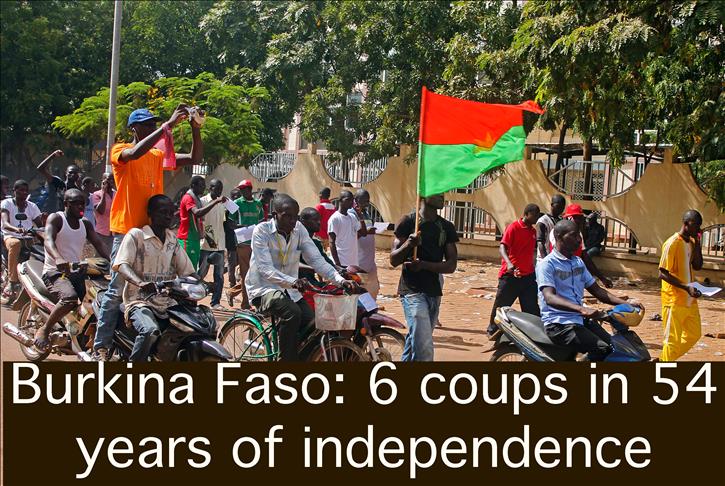Burkina Faso: 6 coups in 54 years of independence
On August 5, 1960, Burkina Faso – then called Upper Volta – gained independence from France under the leadership of then-president Maurice Yaméogo.

By Safwene Grira
OUAGADOUGOU
On August 5, 1960, Burkina Faso – then called Upper Volta – gained independence from France under the leadership of then-president Maurice Yaméogo.
Five years later, Yaméogo had consolidated his grip on power by entrenching a single-party ruling system and repressing the opposition.
By January 1966, a popular revolt had broken out on the heels of an unpopular financial austerity plan approved by Yaméogo.
Yaméogo declared a state of emergency amid a general workers' strike. Unable to contain mounting popular discontent, Yaméogo resigned on January 4, 1966. The military took over power, declaring former army chief-of-staff Sangoulé Lamizana as the new head of state.
In 1980, a severe drought took a devastating toll on Burkina Faso's agricultural sector.
At the same time, a teachers' strike that spilled over to many other labor sectors to protest corruption nearly paralyzed the state.
On November 25, 1980, the forces of the Military Committee of Recovery for National Progress deployed forces to Ouagadougou, setting the stage for Col. Saye Zerbo to overthrow Lamizana and declare himself president.
At the time, the coup was internationally hailed as a "model for democracy" in the region after the adoption of the "Constitution of the Second Republic."
In 1982, divisions within the military committee split the body into two camps. Differences led to a military coup by which Thomas Sankara rose to power. He eventually ceded the presidency to military commander Jean-Baptiste Ouedraogo, who had little political experience.
Accused by critics of "serving the interests of foreign domination and neo-colonialism," Ouedraogo became increasingly isolated within the newly-formed Council for the Salvation of the People (CSP).
Former Prime Minister Thomas Sankara, who had played a key role in the events of 1982, staged a deadly coup a year later against Ouedraogo's military government, which left 13 people dead.
Sankara's takeover of power led to the birth of the National Revolutionary Council, which promised democratic and social reforms, as well as an anti-imperialist foreign policy.
Following the coup, the colonial-era name "Upper Volta" was changed to "Burkina Faso," which in the country's indigenous language means "Land of honest people."
In 1987, fierce clashes broke out between regime loyalists and rebels at Ouagadougou's presidential palace on what came to be known as "Black Thursday."
Thomas Sankara was later killed in a coup orchestrated by his chief advisor Blaise Compaoré, who later remained in power for 27 years.
In 2014, the Compaoré regime insisted on amending the constitution to allow the president to seek a third term in office. The opposition, joined by unions and civil society, declared nationwide "civil disobedience" to protest what they described as a "constitutional coup."
Tens of thousands of protesters gathered in Ouagadougou and other cities to demand Compaoré's removal. Protesters stormed the parliament as well as the state television headquarters in the capital.
As a last resort, amid sustained protests, Compaoré sacked the government and declared a national state of emergency.
Simultaneously, the military command unilaterally dissolved parliament and announced the formation of an interim body led by Army Chief-of-Staff Honore Traore Nabéré to manage the country's affairs for a transitional period.
Anadolu Agency website contains only a portion of the news stories offered to subscribers in the AA News Broadcasting System (HAS), and in summarized form. Please contact us for subscription options.




